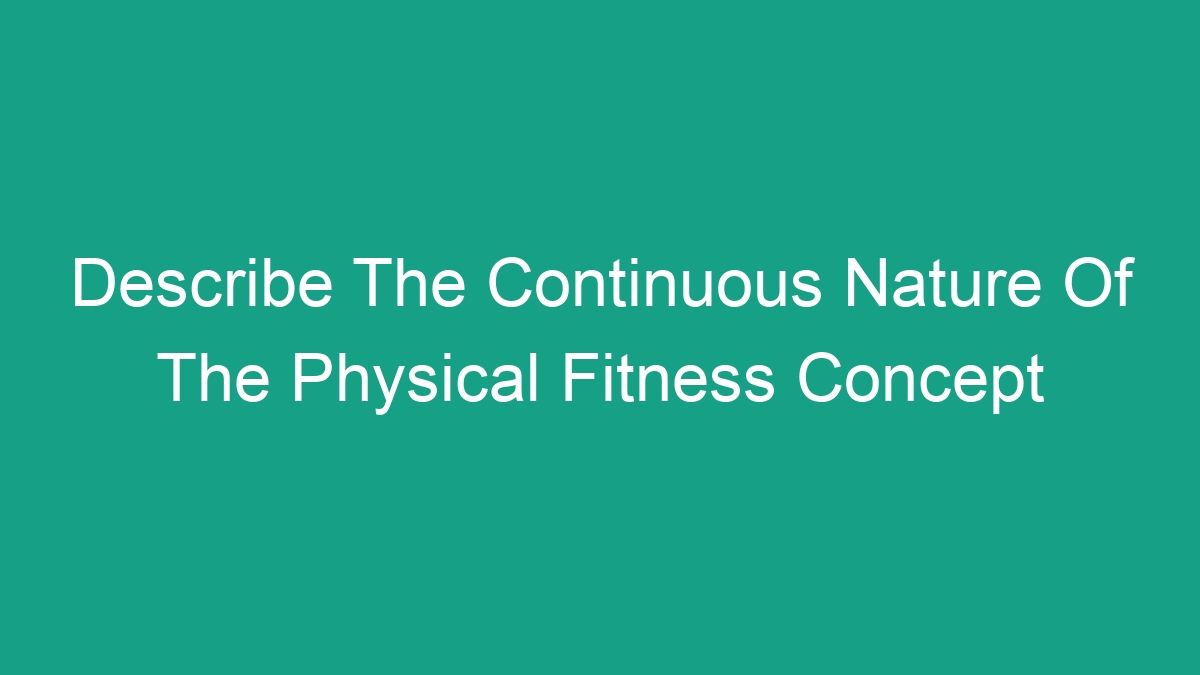
Introduction
Physical fitness is a concept that is constantly evolving and is a crucial aspect of overall health and well-being. It is not a destination but rather a continuous journey of maintaining and improving one’s physical abilities, endurance, strength, and flexibility. In this article, we will delve into the continuous nature of the physical fitness concept, its components, and the importance of incorporating it into our daily lives.
Components of Physical Fitness
Physical fitness is comprised of several components, each playing a significant role in achieving overall well-being.
1. Cardiovascular Endurance: This component refers to the ability of the heart, lungs, and circulatory system to deliver oxygen and nutrients to the body’s tissues during sustained physical activity. Activities such as running, swimming, and cycling are excellent for improving cardiovascular endurance.
2. Muscular Strength: Muscular strength is the capacity of a muscle or a group of muscles to exert force against resistance. Strength training exercises, such as weightlifting or bodyweight exercises, are effective in building and maintaining muscular strength.
3. Muscular Endurance: Muscular endurance is the ability of a muscle or group of muscles to sustain repeated contractions against a resistance for an extended period. Engaging in activities like high-repetition weight training or bodyweight exercises can enhance muscular endurance.
4. Flexibility: Flexibility refers to the range of motion in a joint or group of joints. Activities such as yoga, Pilates, and stretching exercises can improve flexibility and reduce the risk of injuries.
5. Body Composition: Body composition is the proportion of fat and non-fat mass in the body. Maintaining a healthy body composition through a balanced diet and regular physical activity is crucial for overall health.
The Continuous Nature of Physical Fitness
Physical fitness is a continuous process that requires ongoing effort, dedication, and commitment. It is not a one-time achievement but rather a lifestyle that encompasses regular physical activity, proper nutrition, and mindful wellness practices. Here are some key points to emphasize the continuous nature of physical fitness:
1. Consistency is Key: Achieving and maintaining physical fitness requires consistent effort and dedication. It is not enough to engage in physical activity sporadically; rather, it is essential to incorporate regular exercise into one’s daily routine.
2. Progression and Adaptation: Physical fitness is about progressing and adapting over time. As the body becomes accustomed to a particular exercise routine, it is important to vary the intensity, duration, and type of activities to continue challenging the body and achieving improvements in fitness levels.
3. Lifelong Commitment: Physical fitness is not a temporary endeavor but a lifelong commitment to one’s health and well-being. It is crucial to cultivate healthy habits that can be sustained over the long term, rather than resorting to quick fixes or short-term solutions.
4. Mind-Body Connection: Physical fitness is not just about the body; it also involves the mind. Developing a positive mindset, setting achievable goals, and staying motivated are essential aspects of the continuous nature of physical fitness.
Importance of Physical Fitness
The importance of physical fitness cannot be overstated, as it influences numerous aspects of our lives, including health, performance, and overall quality of life.
1. Health Benefits: Engaging in regular physical activity and maintaining physical fitness levels is associated with a myriad of health benefits, including reduced risk of chronic diseases such as heart disease, diabetes, and obesity, improved cardiovascular health, enhanced immune function, and better mental well-being.
2. Performance Improvement: Physical fitness plays a crucial role in enhancing athletic performance, increasing strength, stamina, and endurance, and improving overall physical capabilities.
3. Quality of Life: Being physically fit contributes to a higher quality of life, enabling individuals to perform daily activities with ease, maintain independence as they age, and experience a higher level of overall well-being.
How to Maintain the Continuous Nature of Physical Fitness
Maintaining the continuous nature of physical fitness requires a holistic approach that encompasses various elements, including exercise, nutrition, rest, and mental wellness.
1. Regular Exercise: Engage in a variety of physical activities, including cardiovascular exercise, strength training, flexibility exercises, and activities that promote balance and coordination. Aim for at least 150 minutes of moderate-intensity aerobic activity or 75 minutes of vigorous-intensity aerobic activity per week, along with muscle-strengthening activities on two or more days a week.
2. Balanced Nutrition: Fuel your body with a balanced, nutritious diet that includes a variety of whole foods, such as fruits, vegetables, lean proteins, whole grains, and healthy fats. Stay hydrated and be mindful of portion sizes to maintain a healthy body composition.
3. Adequate Rest and Recovery: Allow your body to rest and recover between exercise sessions to prevent overtraining and optimize performance. Aim for 7-9 hours of quality sleep each night and incorporate rest days into your workout schedule.
4. Mental Wellness Practices: Practice stress-reducing activities such as meditation, deep breathing exercises, and mindfulness to support mental well-being and enhance the mind-body connection.
Conclusion
In conclusion, physical fitness is a continuous journey that encompasses various components and plays a crucial role in overall health and well-being. By understanding the continuous nature of physical fitness and incorporating regular exercise, balanced nutrition, rest, and mental wellness practices, individuals can achieve and maintain a high level of physical fitness throughout their lives. Embracing physical fitness as a lifelong commitment can lead to numerous benefits, including improved health, enhanced performance, and a higher quality of life. It is essential to recognize that physical fitness is not a destination but a continual process that requires ongoing dedication, consistency, and a holistic approach to achieve optimal results.



